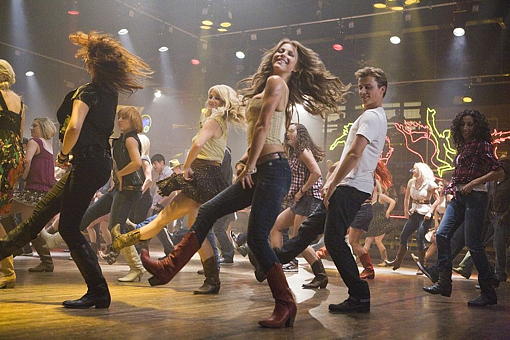Sign up for the
TSL Newsletter
and get $50 off Final Draft 12
By Ryan Mason · October 17, 2011

No Kevin Bacon? No problem. This Footloose updates the original in all the right ways, keeping the elements that we all know and love by incorporating them smartly so they don’t feel tacked on just to pay homage – and actually improving upon them.
I admit it: I’m a bona fide fan of the 1984 classic. See, I even consider it a classic. I dug it so much that I actually saw – and liked – the 1998 short-lived Broadway musical. Suffice to say, I was worried about Craig Brewer’s remake when I saw a trailer that showcased hip-hop dancing and music. Not that those are necessarily bad things, but at the same time, Footloose shouldn’t be You Got Served, either. With Brewer’s first film being Hustle And Flow, I thought that could be completely possible.
Thankfully, it’s not. In fact, it’s so much like the Kevin Bacon-starmaker that original screenwriter Dean Pitchford still gets credits for both story and screenplay (shared with Brewer). Much of the same dialogue gets re-used here but freshened up nicely by Brewer so that it doesn’t feel quite as dated – like the whole “I thought only assholes say pansy” line.
This is one of those remakes that actually improves upon the original, with Brewer’s changes enhancing the plot, the best of which is Ren McCormack’s backstory. In the original, Ren and his mother fall on hard times in Chicago, and so they end up moving in with Ren’s aunt and uncle in Beaumont (somewhere in the Bible Belt) where Ren finds out that, due to a teen tragedy years before, dancing has been outlawed in the city limits. Brewer’s version sticks to this same plot with the seemingly small change of Ren moving from Boston alone to live with his aunt and uncle in Bomont (a small town just outside of Atlanta) – his mother having died of leukemia being the cause of his migration. It’s a savvy story addition that allows for a stronger beat later on in the movie where Ren makes a better case when battling Reverand Shaw Moore (Dennis Quaid stepping ably into John Lithgow’s shoes) over ending the dancing ban.
Brewer’s choices at the script level all come organically from the original script, like having Ren’s rival, Chuck Cranston be a local stock car racer which allows for a more intense “battle” scene, which in the original involved racing two tractors head-on at each other in a game of chicken, but now becomes a demolition derby with school buses. And Brewer manages to incorporate these new elements while retaining the same feel from the similar scenes in the original. In some cases, like the bus scene, the new versions work far better than in the original. (Perhaps it’s not all that fair since 1984 was a different time and there’s a certain corniness level that you just accept as being indicative of the era. Still, as a movie, racing tractors by definition can only be so exciting no matter how you shoot it.)
Long story short: this is how you remake a film.
Brewer capitalizes on his strong script by casting the right actors for the roles. I have no idea if newcomer Kenny Wormald will parlay this part into A-list Hollywood stardom like his predecessor did, but it wouldn’t surprise me if he did. He’s far and away a better dancer than Bacon, but he also has the acting chops to back it up. He holds his own against Dennis Quaid and has a swagger of confidence without being cocky. But the real breakout star here is Miles Teller as Willard. He steals every scene he’s in as the loveable hayseed who can’t dance. The only thing that is a bit of a stretch is that Willard is supposed to be a hot-head who gets into fights often, which made sense when he was played by the late Chris Penn, but here, Teller just doesn’t come off like much of a fighter. It’s minor detail that Teller more than makes up for with his charm and spot-on comedic timing.
Now, all of this would still be pointless if the music doesn’t work. You just can’t have a movie called Footloose and not use the classic titular song. And thankfully Brewer doesn’t bother to fix what isn’t broken by having some modern artist re-do it: his film also opens with close-up dancing shots of feet set to the Kenny Loggins original in all its ‘80s glory. And while you won’t hear the exact versions of “Dancing In The Streets” or “Holding Out For A Hero,” they’re instead remade in hip-hop and country-western veins, respectively, which completely works. Brewer tackles the music like he does the script, by keeping what works and even taking it to the next level.
Even if you haven’t seen the original, Footloose works on its own. It’s a ridiculously fun flick that, given how much depressing news dominates our media these days, you just sometimes need every now and then. Footloose is a total blast at the theater, a movie that will end up being a great addition to your Blu-ray collection for dozens of repeat viewings.
Until the inevitable 2031 remake, of course.